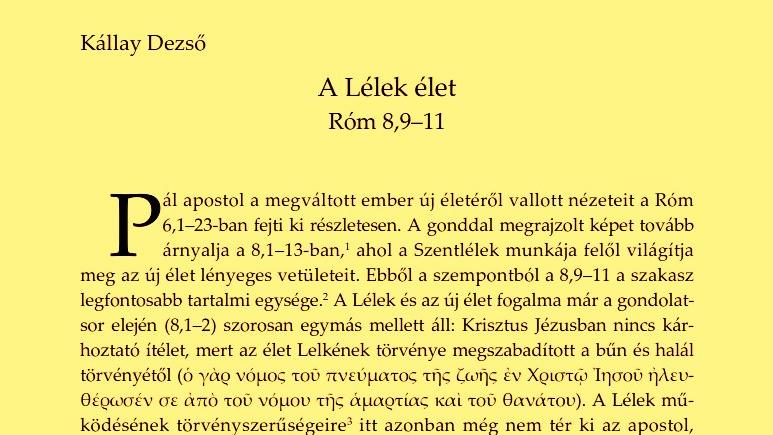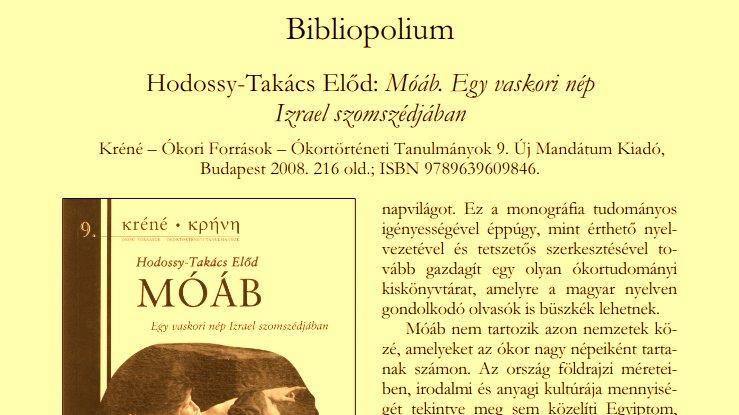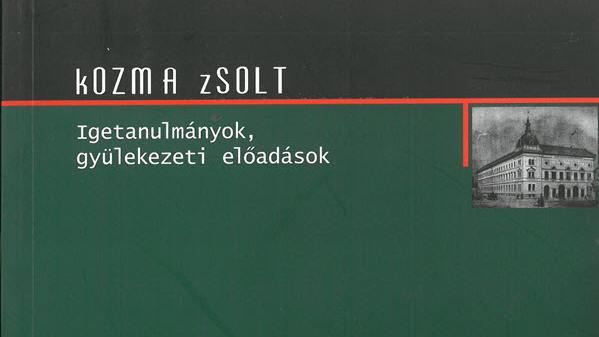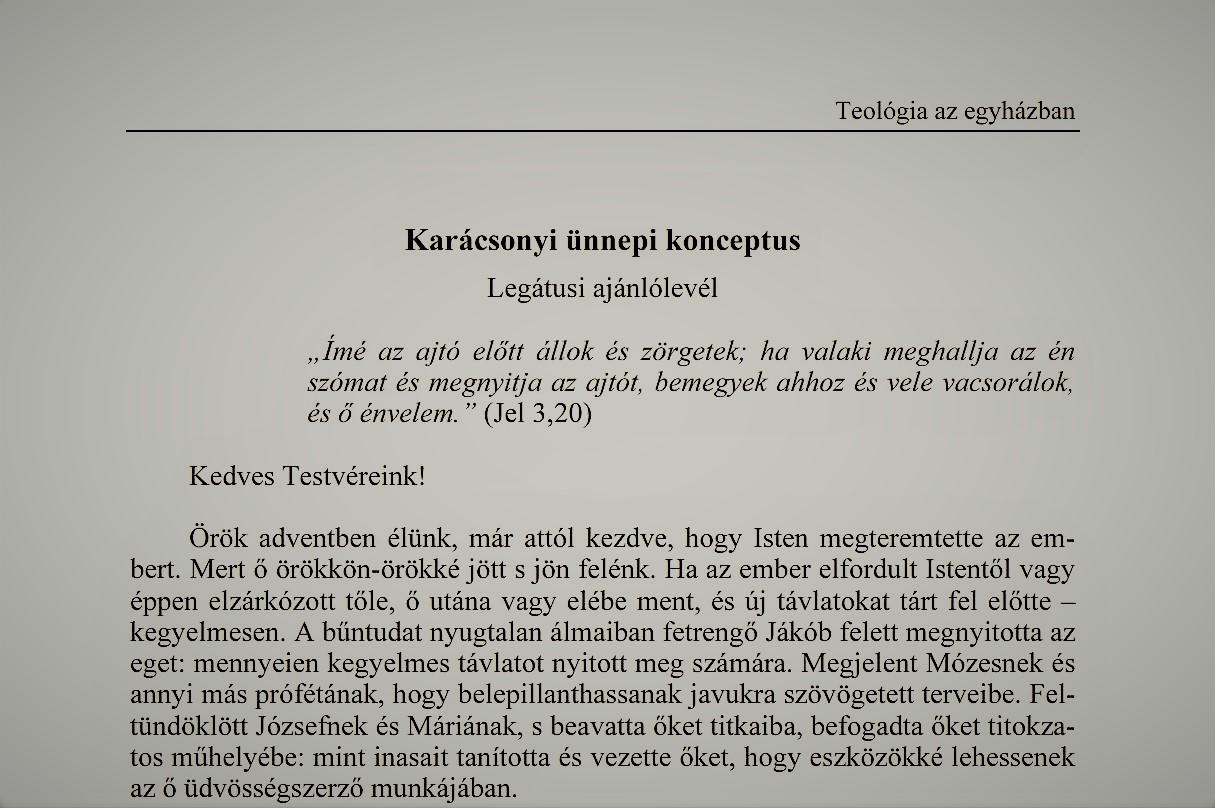Publications
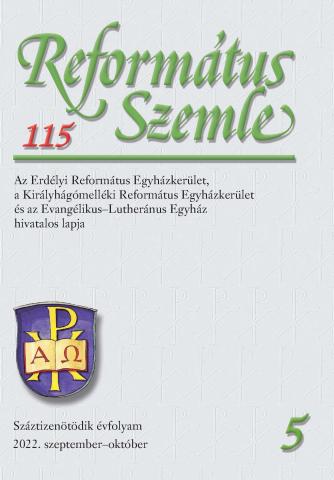
Miklós-Kovács Tamás › 2022 › Pages: 547--562E tanulmány Jonathan Edwards Isten szépségéről megfogalmazott gondolatait ismerteti. Írásaiban és prédikációiban megfogalmazott tézisei nem nyújtanak egységes meghatározást Isten szépségről, és nem formálódtak egy terjedelmes művé. A tanulmány első felében Jonathan Edwards rövid életrajza után azt foglalom össze, hogy mit vallott Isten szépségéről és létezéséről. A tanulmány második részében a leggyakrabban idézett Isten végtelenül felmagasztalt dicsőségében és kiválóságában emelkedik minden teremtett lény fölé című prédikációjának fordítását közlöm.
Research article › Systematic theology › puritanizmus, esztétika, szépség
Simon Attila › 2022 › Pages: 533--546Ez a tanulmány Kálvin hatalmas írott hagyatékának csupán egyik szelete alapján vizsgálja, hogy a reformátor miként használta az örök élet és a halál fogalmát. A zsoltárok könyvéhez és a János evangéliumához írt kommentárja, valamint levelezései jól érzékeltetik, hogy az Isten által teremtett embernek milyen változásokon kell átesnie, hogy a halállal való szembenézés súlyos próbájában az örök élet reménysége tudjon enyhülést és segítséget nyújtani számára. Kálvin biztos talajon áll az örök élet és az örök halál állapota tekintetében, viszont az eszkhatológiai kérdések tekintetében hol…
Research article › Systematic theology › teológiatörténet, halál, halál utáni élet
Nagy Eszter › 2022 › Pages: 511--532Rolf Theobold Kurzzeit-seelsorge című könyvének első hat fejezete főként a rövid tartamú lelkigondozás elméleti megalapozását tartalmazza. A könyv következő fejezeteinek tartalmi ismertetése a rövid tartamú lelkigondozás gyakorlatának ismertetése során fog nagyobb hangsúlyt kapni. Az elméleti megalapozása során betekintést nyerhettünk Milton Erickson és utódai által kidolgozott rövid terápia azon lépéseibe, amelyek alapját képezik a rövid tartamú lelkigondozói beszélgetésnek is. Ezen kívül a szerző külön alfejezetben tárgyalja a rendszerszemlélet és a konstruktivizmus alapjait, amelyek a…
Research assessment › Practical theology › lelkigondozás, rendszerszemlélet, terápia
Kocsev Miklós › 2022 › Pages: 499--510A hitelesség – mint létforma – az elmúlt évek egyik meghatározó területe a lelkipásztor életének. Az előadás témája a hitelesség kapcsán három irányba kíván vezetni. Ezek a következők: hitelesség az Igéhez, a szervezethez és a lelkésznek önmagához. Az tartalmát illetően előadás inkább egy szakmai életút tapasztalatainak összefoglalása, mint tudományos munka, és lehetőséget kínál saját emberi és hivatásbeli hitelességünk végigggondolására.
Research article › Practical theology › lelkészi identitás, lelkészképzés, hitelesség, szolgálat, lelkipásztori szolgálat, szakmai életút
Nagy József › 2022 › Pages: 479--498Ez a tanulmány a Kol 3,11 jelentését tisztázza, összehasonlítva azt a Gal 3,28 és az 1 Kor 12,13 verseivel. A visszatérő "görög és zsidó" vagy "rabszolga és szabad" kifejezések ellenére sem bizonyítható, hogy e három szöveg valamilyen rögzített beszédmódot képvisel. Ez pedig azt jelenti, hogy mindhárom felsorolás az adott szövegösszefüggésben nyeri el értelmét. Ennek megfelelően a Kolossébeliekhez írt levél, és különösen a Kol 3,5-17 kontextusának összefüggésében megállapítható, hogy az 5. és 8-9. versekben említett bűnök katalógusával ellentétben a Kol 3,11-ben felsorolt személyi…
Research article › New Testament › exegézis (szövegértelmezés), Kolosséi levél, keresztség, körülmetélkedés
Kurta József Tibor › 2022 › Pages: 45--53Egyik leghányatatottabb sorsú nyomtatványunk kilenc példányát mutatja be a tanulmány, amelyek a Kolozsvári Protestáns Teológiai Intézet könyvtárában maradtak fenn az utókor számára. Könyv- és könyvtártörténeti adatok sora példázza, hogy ez a kilenc kötet milyen utat járt be 1661-től napjainkig, hány kézen mentek át különböző intézmények és magánszemélyek használatában. A károsodás, vagy akár szándékos csonkítás, az átkötés, kiegészítés, továbbörökítés egyaránt része a történetüknek. Sok mindennek voltak a tanúi, hogy most konzerválva, megfelelő tárolási körülmények között, nemzetközi…
Research article › Church history › Biblia, bibliakiadás, magyar bibliakiadások, Váradi Biblia, könyvtörténet, könyvtár-történet, Kolozsvári Protestáns Teológiai Intézet Könyvtára
Kurta József Tibor › 2022 › Pages: 15--29A reformáció eszméinek meggyökerezése az anyanyelvű istentisztelet és írásmagyarázat elengedhetetlen eszközévé tette a magyar nyelvű Szentírást. A magyar református egyház zsinatai már a kezdetektől kötelezték a lelkipásztorokat, hogy „a Szentírást forgassák kezükben éjjel nappal”, azt is megszabva, hogy „a tudósabbak latin és magyar, a tudatlanabbak magyar Bibliát vegyenek maguknak”. Ehhez viszont Bibliákra volt szükség, latinra is, de főképp magyarra.
Research article › Church history › Biblia, bibliakiadás, magyar bibliakiadások, Váradi Biblia, nyomdatörténet, könyvtörténet
2022 › Pages: 1--86Series, Journal › Varia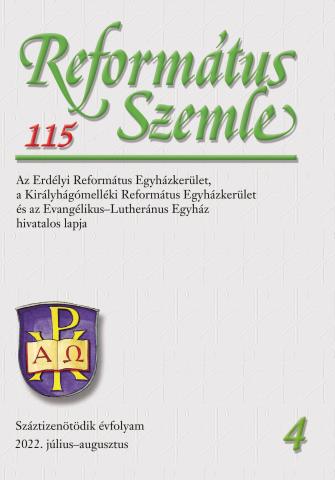
Kolumbán Vilmos József › 2022 › Pages: 343--350Report › Varia, Other › tanévzárás, Kolozsvári Protestáns Teológiai Intézet, rektor
Ambrus Mózes › 2022 › Pages: 340--342Greeting › Varia, Other › Kolozsvári Protestáns Teológiai Intézet, búcsúbeszéd
Balogh Csaba › 2022 › Pages: 338--339Report › Varia, Other › Kolozsvári Protestáns Teológiai Intézet, tanévzárás
Kulcsár Árpád › 2022 › Pages: 336--337Review › Church history › Királyhágómelléki Református Egyházkerület, püspök
Kulcsár Árpád › 2022 › Pages: 332--335Review › Church history › Királyhágómelléki Református Egyházkerület
Bálint Péter › 2022 › Pages: 306--331A folkloristák mindmáig adósak maradtak a Jézus-mintázatok lehetséges előfordulásának kimutatásával a mesenarratívákban. Ezt a hiányt igyekszem pótolni. A kárpát-medencei mesemondók előszeretettel teremtettek párhuzamot a mesehős és Jézus élete, tettei között. A csodás születés, az isteni származás, a rejtett gyermekkor, a gyógyító tevékenység, a kereszthalál, az alvilágjárás, a feltámadás példázatként történő elbeszélése gazdag variánsokban mutatkozik meg. A hasonlóságok és eltérések azt mutatják, hogy a paraszti közösségekben hétköznapi emberként, tanítóként és a szegények segítőjeként…
Research article › Varia, Ethnography / Ethnology › Jézus-mintázat, forráskritika, népi vallásosság, népmese
Borsi Attila János › 2022 › Pages: 280--305A keresztyén kegyesség gyakorlatának helyes szemlélete és megértése a keresztyén élet nélkülözhetetlen része. Ennek megítélése más és más hangsúllyal, fókusszal jelent meg a keresztyén egyház korszakaiban, amelynek oka nem csupán abban keresendő, hogy az egyházban eltérő kegyességgyakorlatok honosodnak meg a különböző időszakokban. A kegyesség gyakorlata ugyanis minden vonatkozásban narratív és interpretativ funkciót tölt be. Narratív abban a tekintetben, hogy keretet ad a keresztyén ember önértelmezésének. Interpretativ abban a vonatkozásban, hogy nem önmagában áll meg, hanem egyrészt a…
Research article › Practical theology, Varia, Spirituality › megszentelődés, kegyesség (spiritualitás), pietizmus, szerzetesség
